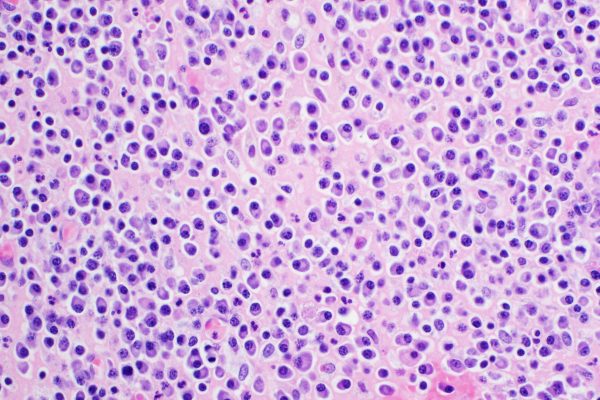
Elotuzumab plus lenalidomide and dexamethasone has shown to improve progression-free survival (PFS) and overall survival (OS) vs. lenalidomide and dexamethasone in patients with relapsed or refractory multiple myeloma. ELOQUENT-1 assessed whether this triplet could also improve PFS in patients with newly diagnosed multiple myeloma who are ineligible for HSCT. Unfortunately, adding elotuzumab did not improve PFS in this setting, and further research is needed to find ways to improve front-line treatment.
Effective first-line treatments for patients with multiple myeloma who are ineligible for haematopoietic stem-cell transplantation (HSCT) are crucial. Elotuzumab plus lenalidomide and dexamethasone has shown improved progression-free survival (PFS) and overall survival (OS) vs. lenalidomide and dexamethasone in patients with relapsed or refractory multiple myeloma. These results led to the approval of elotuzumab plus lenalidomide and dexamethasone in this setting. ELOQUENT-1 is a phase 3 trial conducted to assess whether elotuzumab plus lenalidomide and dexamethasone can also improve progression-free survival (PFS) compared with lenalidomide and dexamethasone alone in patients with newly diagnosed multiple myeloma who are ineligible for HSCT.
The open-label, multicentre, randomised, phase 3 ELOQUENT-1 trial enrolled adult patients (≥18 years old) with newly diagnosed, untreated, symptomatic myeloma. Eligible patients were not candidates for high-dose therapy plus HSCT because of age (if aged ≥65 years) or comorbidities, and had an Eastern Cooperative Oncology Group (ECOG) performance status of 2 or lower. Patients were randomly assigned (1:1) to receive elotuzumab plus lenalidomide and dexamethasone or lenalidomide and dexamethasone. Randomisation was stratified by the International Staging System (ISS; stage I-II vs. III), age (<75 years vs. ≥75 years), and ECOG performance status (0 vs. 1–2). Patients in the elotuzumab plus lenalidomide and dexamethasone group received elotuzumab administered intravenously at 10 mg/kg on days 1, 8, 15, and 22 during cycles one and two, days 1 and 15 during cycles 3-18, and then at 20 mg/kg on day 1 for subsequent cycles. In both treatment groups, patients received 25 mg lenalidomide orally on days 1–21 of each cycle and 40 mg dexamethasone on days 1, 8, 15, and 22 of each cycle. The primary endpoint was PFS.
Overall, 748 patients were randomly assigned to receive elotuzumab plus lenalidomide and dexamethasone or lenalidomide and dexamethasone (374 in each group). Eventually, 742 patients received treatment, 371 in each group. The median age of patients was 73 years old, and 39% of the patients were 75 or older. After a minimum follow-up of 65.3 months, the median PFS was not significantly different between the groups: 31.4 vs. 29.5 months in the elotuzumab+lenalidomide+dexamethasone or lenalidomide+dexamethasone groups, respectively (HR[95%CI]: 0.93[0.77-1.12]; p=0.44). PFS rates at five years were 26% vs. 25%. PFS results in both treatment groups were consistent across key patient subgroups. As the primary endpoint of this study was not met, the secondary endpoint analyses were descriptive. The overall response rate was 83% vs. 79%. The proportion of patients who had a very good partial, complete, or stringent complete response was 53% vs. 49%. The time to disease progression, time to next treatment, and progression-free survival after the next line of treatment showed no significant differences between treatment groups.
The most common grade 3-4 treatment-related adverse event (AE) was neutropenia: 17% vs. 21% in the elotuzumab+lenalidomide+dexamethasone and lenalidomide+dexamethasone groups, respectively. The most common any-grade non-haematological AEs included diarrhoea (53% vs. 49%), fatigue (49% vs. 50%), and peripheral oedema (44% vs. 49%). The most common any-grade haematological AEs were anaemia (41% vs. 44%) and neutropenia (25% vs. 32%). All-cause adverse events leading to discontinuation occurred in 54% of patients in the elotuzumab-arm vs. 46% in the control group.
Although effective for patients with relapsed or refractory multiple myeloma, elotuzumab plus lenalidomide and dexamethasone did not significantly improve PFS vs. lenalidomide and dexamethasone in patients with newly diagnosed multiple myeloma who are ineligible for HSCT. Treatment with elotuzumab plus lenalidomide and dexamethasone was well tolerated, and no new safety signals were identified. Although these data contribute to the treatment landscape, further research is needed to find ways to improve treatments in the front-line setting.
Reference